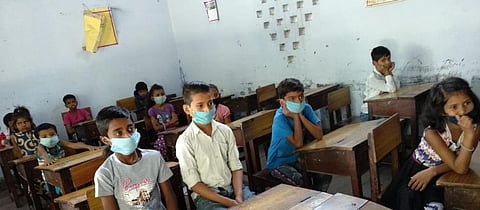Children's Day amid COVID-19: Pandemic has made life tougher for disadvantaged kids
The novel coronavirus disease (COVID-19) pandemic has thrown lives out of gear for all of us. But the impact has been disproportionately felt by those from already disadvantaged communities.
Children from these communities have been the worst affected. All aspects of their life have taken a hit — their protection, nutrition as well as education.
The socio-economic distress caused by the pandemic has made matters worse for children living in poverty. These include those at risk of child labour, early marriage and trafficking, children with special needs and those in care institutions.
Besides, they are being exposed to increased exploitation and abuse. With the lockdown restricting their mobility and outdoor recreational activities, having to stay confined within deplorable housing conditions has led to increased levels of anxiety among them, adversely impacting their mental health.
For homeless and street children too, the pandemic has brought increased vulnerabilities. The closure of schools, loss of livelihood of parents and absence of any safety nets have pushed them into child labour.
Moreover, the COVID‑19 pandemic seems to be taking us in the same direction as what the Ebola pandemic led to in Sierra Leone. This was an increase in the number of child marriages and adolescent pregnancies.
According to a recent United Nations Population Fund report, this pandemic can add 13 million more child marriages to the global list. In India, the various child helplines seem to be validating this estimate. Increased levels of risks are being reported among these vulnerable children in the current times.
With several families engaged in the informal sector losing their livelihoods, children in the family have also been deprived of basic nutrition. Add to it the fact of school closures that deprived them of even the mid-day meals which used to be a source of food and nutritional security for many.
This scenario has, therefore, aggravated food insecurity and led to nutritional deficiency among children, which is adversely affecting their health and physical and mental development.
The pandemic, as we know, has hugely disrupted the schooling system for children since March. School closures have given way to the idea of online education.
But how viable is it as an alternative? Requirements range from access to smartphones, availability of internet and decent living conditions and home environment.
WIth that in mind, the transition to this alternative has certainly got us thinking about how inclusive it is and whether it is deepening the divide and learning gaps between the haves and the have-nots.
Moreover, the access to digital tools is increasing certain risks. For instance, children, especially girls, are becoming more vulnerable to cyber-bullying and sexual exploitation as their parents lack adequate knowledge on how to supervise children while using the internet.
Needless to say, the ongoing pandemic has adversely impacted the overall well-being and growth of children, affecting their health, nutrition, education, personality development and in the longer run, even their future livelihood prospects.
The economic security of parents has been critical to ensure families’ resilience in the aftermath of any disaster, including ensuring care and protection of children.
Hence, the need to bring these vulnerable families out of the circle of poverty cannot be ignored.
While grappling with these challenging times, the government, in coordination with civil society organisations, should ensure food and nutrition support, adequate protection services, popularisation of psycho-social counselling, handholding support to orient parents to talk with their children according to their age and other factors, provisioning of targeted material for children’s education, exemption of payments of the various utilities and support towards restoring livelihoods.
All these would go a long way in strengthening families socio-economically and empowering them, which would subsequently have a huge role to play in enhancing their capacity to ensure care and protection of children.


